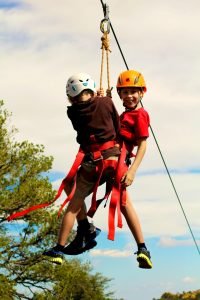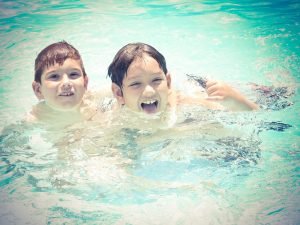For many of us, summer camp was an unforgettable part of our childhood. We made friends, learned new skills, and experienced different surroundings…all adding up to memories that last a lifetime. What you may not have realized, in between archery lessons and roasting s’mores, is that you were also building what mental health experts call “resiliency” – the quality that allows us to bounce back from tough times. Psychologists say that these experiences help us develop coping strategies, offering a sense of belonging, fresh air and exercise to help their physical development, a sense of culture… Together these things add up to resiliency.
Obviou sly, resiliency is an especially important quality for kids who have witnessed or experienced domestic violence. According to REACH’s Clinical Coordinator, a camp experience for kids who have been impacted by violence can improve resiliency by providing opportunities for mastery (like learning to swim or camp out). It is a chance for a child or teen to be in nature, which is healing on its own. Camp allows children to develop sometimes lifelong relationships with peers and adults. Lastly, it gives children a respite from the often very scary and adult-focused world that they live in and allows for them to be immersed in a child-centered environment.
sly, resiliency is an especially important quality for kids who have witnessed or experienced domestic violence. According to REACH’s Clinical Coordinator, a camp experience for kids who have been impacted by violence can improve resiliency by providing opportunities for mastery (like learning to swim or camp out). It is a chance for a child or teen to be in nature, which is healing on its own. Camp allows children to develop sometimes lifelong relationships with peers and adults. Lastly, it gives children a respite from the often very scary and adult-focused world that they live in and allows for them to be immersed in a child-centered environment.
For this reason, REACH works hard every year, along with longtime financial partner the Steve Glidden Foundation, to send as many of the children we work with as possible to camp in the summer. This year, we were able to support 13 children with summer camperships at a variety of places including the Waltham Boys and Girls Club, YMCA of Greater Boston, and even one with an extended time at the Outward Bound Intercept Program. Most of the campers attended 4 or more weeks of camp. Here are some of the stories that survivors shared with us about their kids’ experiences at camp:
Karla, a survivor who works with one of our Community Advocates, sent her 2 daughters to multiple sessions of overnight camp. She likes it because they get a chance to be away and feel some freedom and independence. She has a full household at home and younger children, so the experience gives the 11 and 13 year old a break. They have made friends they only get to see in the summer at camp and they love going back and seeing them. She said after camp they come home thinking they’re quite mature, which Mom may or may not totally agree with!
Pamela has a son and daughter who went to a local YMCA, which she raved about. She sent  them because she believes camp is important to the social and emotional development of her kids, as well as getting them outside, being active, and building their comfort around water. She likes the diversity of this camp, and the variety of activities they do. Her daughter puts her bathing suit on in the morning, even though they don’t swim until the afternoon, because she just loves swimming lessons so much! They come home singing new songs and it just feels happy. The camp gives ‘high fives’ as a special positive reinforcement. Each finger in the ‘high five’ stands for something, like courage, or responsibility. She likes how her kids have been working hard to earn high fives.
them because she believes camp is important to the social and emotional development of her kids, as well as getting them outside, being active, and building their comfort around water. She likes the diversity of this camp, and the variety of activities they do. Her daughter puts her bathing suit on in the morning, even though they don’t swim until the afternoon, because she just loves swimming lessons so much! They come home singing new songs and it just feels happy. The camp gives ‘high fives’ as a special positive reinforcement. Each finger in the ‘high five’ stands for something, like courage, or responsibility. She likes how her kids have been working hard to earn high fives.
Lydia’s teenage son did Outward Bound. She said that the program is flawless, and she couldn’t be happier with how it’s organized. Her hopes going into it were high, because he’s been experiencing some struggles lately. She said camp exceeded all expectations, but it’s up to him what he does with the experience. So far, she sees a positive response. Her son’s favorite part (other than getting to come home!) was something called ‘the crash’. As part of the trip he did a 2-night solo in the woods. He had to trek his own path, while carrying a 70 pound canoe, to find a place to camp. Forging this path is ‘the crash’ and he felt a great sense of accomplishment, personal autonomy, and self-sufficiency. He was the only camper to complete both nights and not return to camp early. The camp put a lot of focus on communication, and Lydia feels this really paid off. She is grateful that he was able to re-experience life as his authentic self. She has high hopes for him heading into this next school year.
We are so grateful to the Steve Glidden Foundation for making camp possible for the kids we work with, and to all of our donors who support our work with families year-round. These are just a few of the many stories we heard. These kids have often seen and experienced things no child ever should. Now they are heading into the school year with increased resiliency and memories to last a lifetime.





